View from a room
Share #UpbeatOnline
With the Royal College of Music campus temporarily closed from mid-March, staff, students and alumni have been teaching, learning and making music in their homes. In May and June, Upbeat spoke to six members of the RCM community about their workspaces and to find out about items surrounding them as they spend this time at home.
Julieth Lozano, soprano and RCM alumna
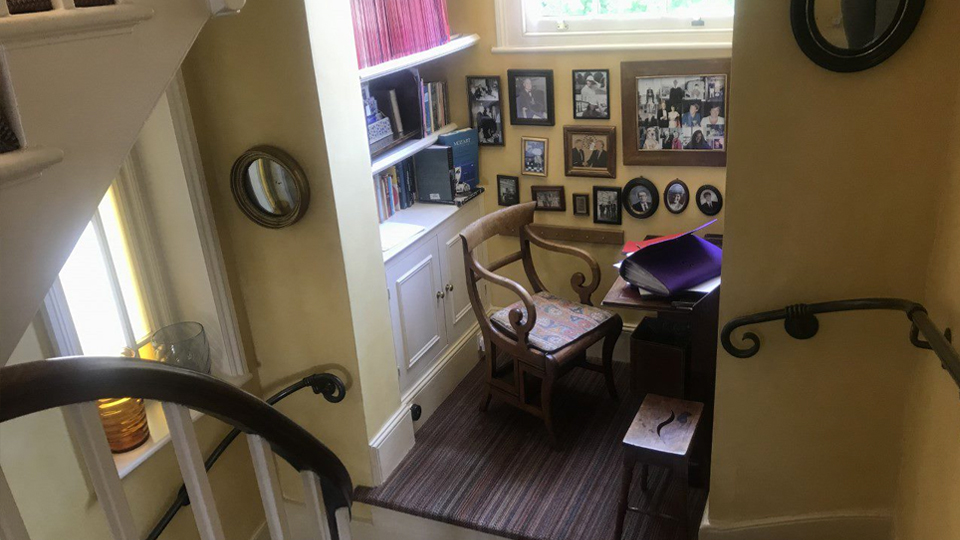
Julieth has been spending lockdown at the home of RCM benefactors Sir Peter and Lady Walters.
Firstly, can you tell me about a typical day spent working here?
I use this space to sort my scores and work through texts, translations and everything that needs my total concentration, as it is like an office, but it still feels spacious enough and it is well lit. I have a tendency to feel claustrophobic, so I like that it is right next to the stairs for whenever I need a mental and physical break!
Looks like those shelves contain some interesting things, can you tell us about what's there? Are you studying any of the scores currently?
The shelves are also interesting for me because they are a mixture of my books and Sir Peter's too. The red books are especially fascinating for me because those are the programmes of every opera Sir Peter and Lady Walters have been to at the Royal Opera House, since before I was born (1991)! So a truly intriguing way to research who was singing, conducting and directing!
Is this a space you have been practising in as well?
Sometimes I sing here too but only because it leads to the stairs and I found the acoustics are nice. But I don't usually do it, as it is right next to my neighbour’s window and no one wants an opera singer practising scales every day next to you!
Lastly, what can you hear from your surroundings when you're working? What can you hear out the window?
I can hear everything through that window. It leads to a beautiful set of gardens, not just those belonging to the house it connects to the other neighbours' gardens too. I hear lots and lots of birds, and sometimes cats or children playing outside. In the last few weeks there have been some building repairs going on outside the house so I can also hear that for sure!
George Harliono, BMus(Hons) pianist
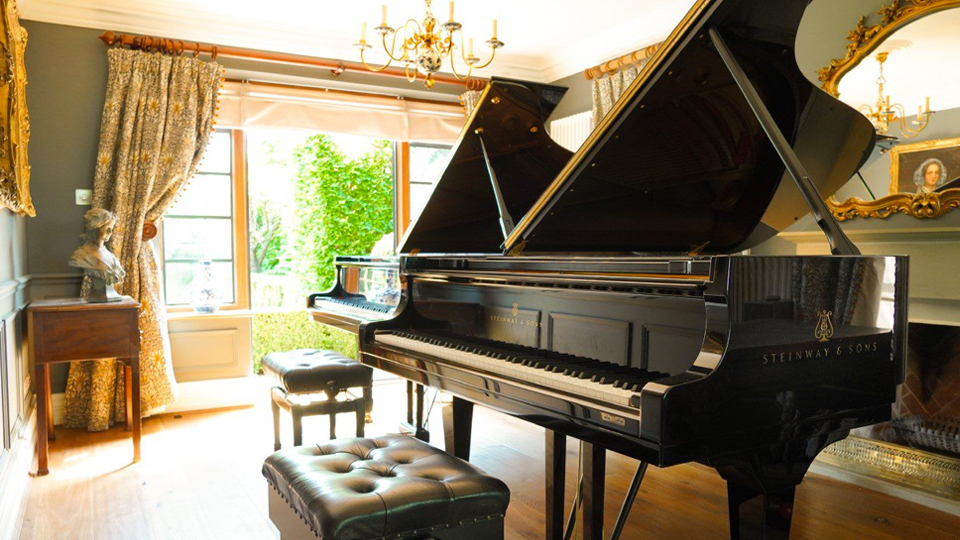
Firstly, what incredible pianos. What is their history and how long have you been playing on them?
The piano at the back is a Yamaha C3. This was my first grand piano and I've had it for around nine years. The piano at the front of is a Steinway Model B. I was given this piano by a Private Jet Charter company, Luxaviation. It’s a really beautiful piano and I'm very grateful for the support of Luxaviation. To be able to practise every day on such a high-quality instrument is a real privilege.
How long do you spend practising in here each day?
At the moment, I'm able to practise a lot more than usual. I'm making the most of the time I have to learn lots of new repertoire. Recently I've been practising around eight hours a day, though it varies quite a lot. I’m also finding time to do things that I’m usually too busy to do. I’m spending lots of time with my family and also doing lots of cycling, which is one of my favourite hobbies.
That looks like a lovely garden, can you tell me about it? Are you able to do any work outside?
When the weather is good I’ve been spending lots of time outdoors. Our garden was once owned by John Drake MBE who served for many years as a judge for the Royal Horticultural Society at the Chelsea Flower Show. It’s a very beautiful garden, it even used to be open for public visits.
Usually during the summer I travel a lot for performances. It’s a little disappointing that my concerts have been cancelled this year, however it’s nice to be able to have a break and enjoy the sunshine!
Katy Thomson, ArtDip soprano
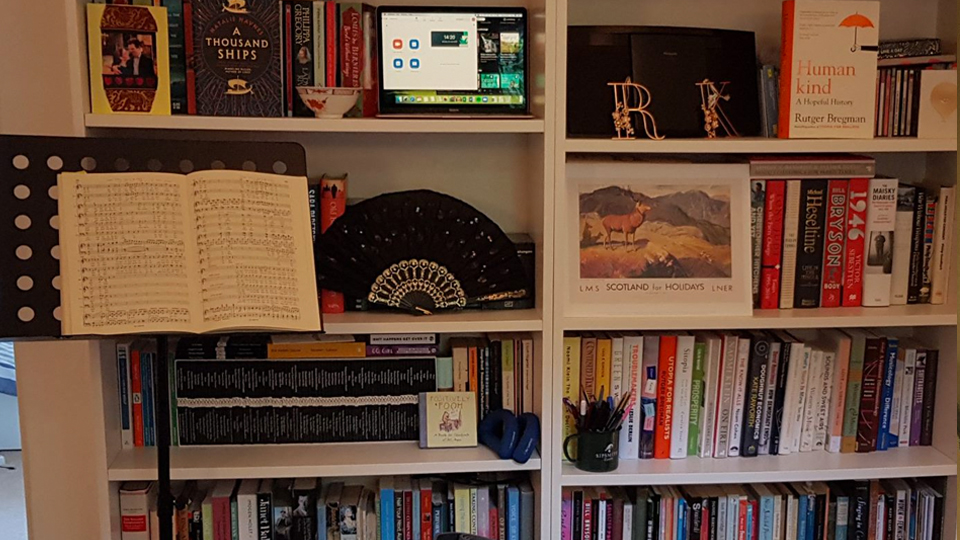
Can you tell me about some of your favourite books we can see on those lovely bookshelves? What's your favourite score in your collection?
That is such a tricky question! I have been really enjoying reading the re-telling of Greek myths from the women's perspective: Nathalie Haynes A Thousand Ships is super (she also has a podcast on BBC Sounds, Standing up for the Classics, which I would recommend as well) and Pat Barker’s Silence of the Girls.
Also anything by Madeleine Miller (Circe or Song of Achilles). I didn't know anything about Greek myths at all until I picked up Circe in a bookshop, and now I love it. My favourite score is a tough one: usually, whatever I am working on at the time!
What is the print we can see on the right, and what does it mean to you?
I am from the lowlands of Scotland but I feel most at home on a mountain in the middle of nowhere in the Highlands or by the sea...! I got this print on the Isle of Skye and it always makes me think of home.
What's on your music stand in the photo - is it something you are rehearsing?
I have been working on the role of Fiordiligi from Mozart's Così fan tutte and thoroughly enjoying the challenges that it presents. I will be assessed on it later in the month as part of the Da Ponte Role Study aspect of the RCM Opera Studio. The music has been buzzing around my head for weeks!
How have you been using your laptop while keeping up with studies at home? Have you been rehearsing using any specific software?
All of my lessons, coaching and classes have been on Zoom. Like everyone, it took me some time to get used to it - but I can really see the benefits now. Working digitally brings much more focus to the session, somehow, and I am incredibly lucky that coaches have sent me recordings of piano accompaniments so that I can practise performing and recording myself (which definitely takes some getting used to!).
I spy some yoga equipment! Have you been incorporating yoga into your days at home?
Yes! I have always incorporated yoga into my daily routine, but it has become more important than ever since lockdown began
Ashby Mayes, BMus(Hons) bassoonist
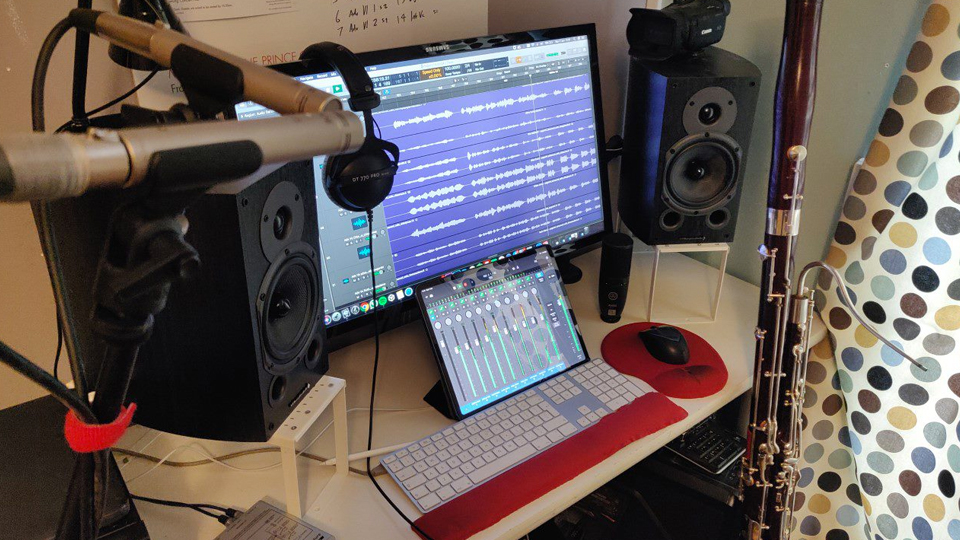
That's an impressive editing set-up. What are you working on?
I am excited to have been working as the Video/Sound/Tech Assistant with the Benedetti Foundation on their Virtual Sessions. The project open on my computer is my work on the audio mix for an arrangement of Paganini’s 24th Caprice for orchestra, brilliantly arranged by the Ayoub Sisters.
This project (open on Logic Pro X) has over 100 audio tracks and it is by far the biggest project I have mixed by myself. The Virtual Sessions consisted of three weeks of online classes, Zoom sectionals, instrumental/musical/wellbeing warm-ups and a lot more. I was delighted to be part of it.
What are the notes above your screen for?
I did the video edit for the Paganini too. This consisted of about 250 different participants including a few professional special guests.
In order to finish the edit in time for the final concert, I created many 'multiclips' of the different instrument groups. The multiclips were numbered 1–19 and the notes you see above my screen show me which instrument group is playing in each multiclip. While editing, I would choose between the various multiclips to show different participants on screen. I have never done a video edit on this scale before, but I really enjoyed it!
I spy your bassoon, are you rehearsing in this space as well? How are you finding music-making at home?
I have dedicated this area of my room for practice as well as video and sound editing. I’ve been having online bassoon lessons with my RCM professors and teaching some lessons myself. I have been recording myself a lot, as a practice aid and to produce various videos that I share on my social media.
I am lucky to have access to good microphones and technology, so I am making the most of that by creating new arrangements and videos. It’s useful to have my bassoon out on a stand just ready to pick up and practise!
I am missing playing with others and can’t wait to be doing that again but have enjoyed finding new ways to create music virtually. At times I have struggled with motivation, but I have been practising the basics and have achieved a new level of deep practice, which is not usually possible during a busy term.
Is that a camera on top of that speaker? What have you been using that for?
Yes, I have been using it for filming many multitrack videos, either with myself or with friends. My quintet (The Albert Quintet) have been making one-minute videos every week or so with new short tunes, and I have been filming myself with this camera. One of my favourite videos is my arrangement of 'Jupiter' from Holst’s The Planets, for which I played seven bassoon parts, along with RCM professor Martin Field on contrabassoon.
It looks like you're someone who's been able to use technology to their advantage during lockdown. How has it helped you continue your studies and keep connected?
My ongoing interest in music and video technology has really proved useful during lockdown and really helped keep me connected to many other musicians. I am very glad to have invested in the microphones that I own because it has allowed me to record myself well and produce things that otherwise I wouldn’t have been able to do.
The videos I have made during quarantine have been viewed thousands of times and have led to new contacts and exciting collaborations. Being able to send good quality recordings to my professors has been really beneficial as they can give more useful feedback. I’m also very happy to have helped many friends with tech advice on what to buy and how to get the best out of their equipment during this time.
Professor Gabriele Rossi Rognoni, Professor of Material Culture and Music, Curator of the RCM Museum
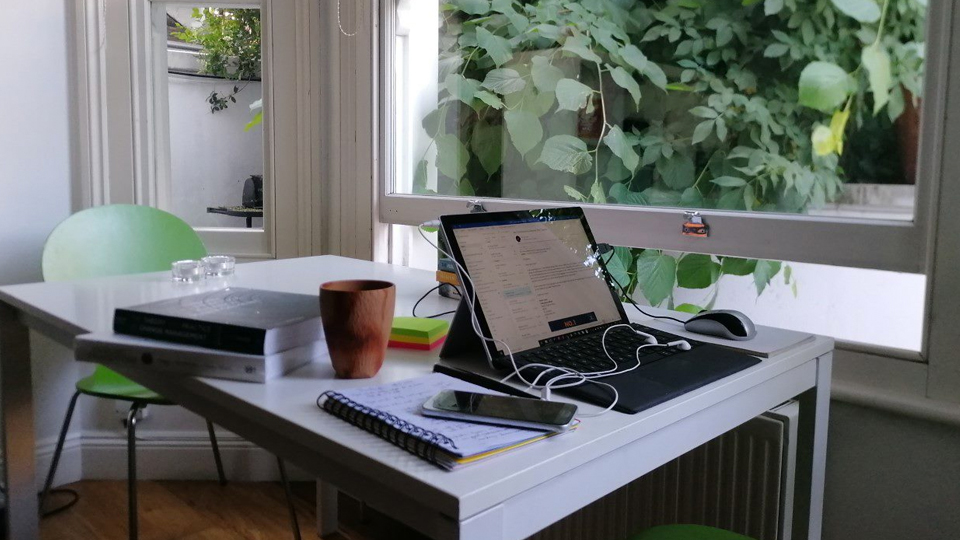
What can you see out of the window when you're sitting at your desk?
I have a large bay-window next to my desk, which brings in lots of light and that I usually keep slightly open. The view is mostly occupied by the branches and leaves of a beautiful lime tree, which also spreads a fragrant smell and produces a soft rustling noise when there is a bit of wind. I also have a partial view of the street.
Since it is a very quiet road there is little passage and I enjoy seeing the occasional passer-by, and I also keep an eye on the arrival of the postman or deliveries.
Tell me about your routine for getting settled into work in the morning.
Since working at home I drastically changed my working pattern partially to suit my own rhythm, and partially to make time for home schooling of my son. I therefore usually start very early, around 6am (and then finish earlier in the day).
I get up, prepare a warm drink (sometimes just warm water, sometimes kefir diluted with warm water and sometimes just some infusion) and set straight for a first session of about 90 minutes, before breaking for breakfast and some exercise and then going back to the main part of my working morning.
I see some books. Can you tell me about them?
The first is on theory and practice of change management, which is a topic that I have always been passionate about. But that becomes particularly pertinent at a time when our museum is preparing to enter its public phase, especially when the entire scenario is radically changing all the time.
The other is about is the relationship between the objects we preserve in museum collections and their cultural/social/functional value, which has often been overlooked in the past when objects entered museum collections. It is a topic where the discussion is rapidly evolving and I am taking the opportunity of the lockdown to read through the vast literature produced over recent years, while I am preparing an article on the subject myself.
What is that cup made from?
It is an earthenware cup which I bought in a small artist shop in Kyoto some years ago. It is the work of an old Japanese artist who was introduced to me by a friend and with whom I spent a most memorable morning.
I use it to drink hot water or green tea, since the material is slightly porous and would not be suitable for milk. It is one of my favourite personal belongings.
Do you listen to anything while you work?
I usually work in silence, but I recently moved to a new space where I am completely alone, and the surroundings are very quiet. So I have experimented with some background music, including sounds of nature, sitar music and Chinese music.
If I listen to anything which I can recognise, my attention is immediately captured by it and it takes me an extra effort to focus on my work. All in all, I am still looking for my ideal soundscape.
Simon Lepper, Collaborative Piano Coordinator
.jpg)
Can you tell us about a typical day working at home in this spot?
A musician's weekly schedule never looks the same. Some days I’m practising alone on repertoire for recitals and CD projects. Other times I’m demonstrating for a student in a private lesson, coaching a singer or rehearsing.
What make is your piano? How long have you had it?
My piano is an old Yamaha. I’ve had it since I was 19 so it’s become part of my life. I’m ashamed to say I only had it serviced for the first time this year. It’s not the finest instrument in the world but it suits me for practising, and it’s taken me through all the stages of my musical life from training to having a concert career.
As a pianist, I find much of the sound you make has to come from your aural imagination. That’s what you take to different concert halls and allows you to adapt to different pianos.
Are the scores we can see what you've been practising lately?
The Schumann was the last piece I was practising as I was meant to be giving a European tour with French baritone Stéphane Degout. The Schubert is part of a recording project that’s in the pipeline with the Austrian tenor Ilker Arcayurek. Fingers crossed we’ll be recording in July… watch this space.
I can see a music stand – are you making music with anyone else while at home?
The music stand is there for when singers or instrumentalists come to rehearse. But currently it’s not in use even though I have been tempted to get out my flute, which was my second instrument. However, my husband who is now a doctor does sometimes play my piano when I’m not looking. I always know. It’s like when someone’s driven your car…
Your garden is lovely! What flowers and plants can we see in this photo? Have you been working outside at all?
I’ve enjoyed creating my small garden. It’s constantly evolving and is a wonderful way to clear my mind after practising or teaching. It’s full of plants that remind me of my upbringing in the countryside: honeysuckle, wild roses, lavender, rhododendrons, ferns etc. The great thing about gardening is if you get something wrong you can always buy another plant! It’s a nice antidote to the focus you require for high-level performing.
Support the RCM
Your support at this time is all the more valuable in bringing the world more music and helping the RCM to thrive. Donations of every size will directly benefit RCM's current and future students.
To make a gift, and find out more about other opportunities such as making a gift in your Will, please visit our support pages.













